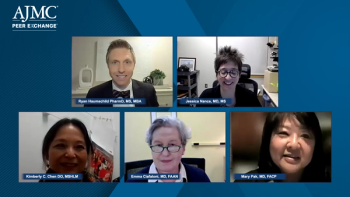
Health care professionals discuss the challenges related to developing and interpreting clinical data for rare disease therapies to guide payer coverage decisions.

Health care professionals discuss the challenges related to developing and interpreting clinical data for rare disease therapies to guide payer coverage decisions.
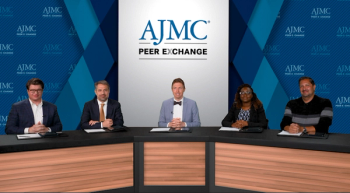
Vivian Tambe Ebot-Tar, PharmD, MBA, leads a discussion on value-based care models based on real-world evidence for the treatment of patients with Philadelphia chromosome-positive acute lymphoblastic leukemia (Ph+ ALL).

Elias Jabbour, MD, discusses findings from the PhALLCON trial relevant to treatment decisions for adult patients with Philadelphia chromosome-positive acute lymphoblastic leukemia (Ph+ ALL).
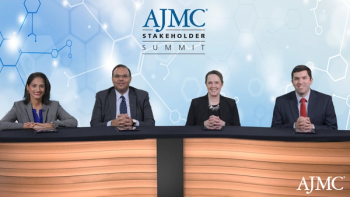
Medical experts emphasize the importance of partnering with community leaders to address social determinants of health that act as barriers to care.

The panel discusses the availability of data on cardiovascular outcomes related to gender and minority disparities, including data collection, reporting standards, and minority participation in clinical trials.
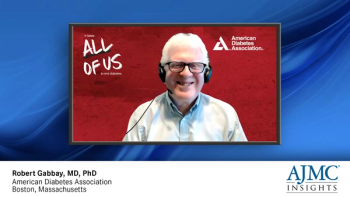
An expert reviews risk factors for type 1 diabetes including autoimmune disease and family history, along with the role of autoimmune antibody screening to enable early disease detection, though access to these specialized tests can be limited.

Kimberly C. Chen, DO, MSHLM, and Jessica Nance, MD, MS, discuss clinical evidence requirements, pricing considerations, and innovative financing models to provide sustainable coverage for the growing pipeline of gene therapies.

Emma Ciafaloni, MD, FAAN, and Jessica Nance, MD, MS, discuss promising developments in gene therapy, highlighting long-term efficacy, enhanced target effects, and the potential impact of early screening on treatment outcomes for genetic diseases.
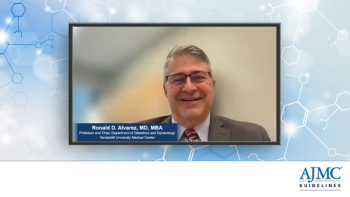
Ronald D. Alvarez, MD, MBA, provides closing commentary on the current ovarian cancer treatment landscape and the promising outlook over the next 20 years.

A medical professional examines the pivotal roles of molecular profiling, next-generation sequencing, and germline testing in guiding treatment decisions for ovarian cancer.

Jonathan Abbas, MD, compares the safety and effectiveness of different targeted agents and considerations when selecting a frontline regimen for adult patients with Philadelphia chromosome-positive acute lymphoblastic leukemia (Ph+ ALL).

Elias Jabbour, MD, provides an overview of the history of targeted agents and the use of tyrosine kinase inhibitors (TKIs) in the treatment of Philadelphia chromosome-positive acute lymphoblastic leukemia (Ph+ ALL).

Natalie Evans, MD, MS, FAHA, describes a successful community awareness campaign, which she hopes will serve as a model for future advocacy efforts.

Natalie Evans, MD, MS, FAHA, raises awareness for peripheral arterial disease and highlights how minority populations are often disproportionately affected.
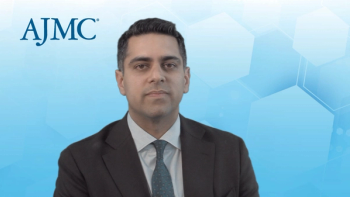
Shawn Kwatra, MD, dermatologist, John Hopkins University, discusses late breaking study results on the long-term efficacy and safety of nemolizumab in patients with prurigo nodularis (PN).

Robert Gabbay, MD, PhD, discusses the early intervention at the asymptomatic stages of type 1 diabetes characterized by autoimmune antibodies and gradual blood sugar elevations.

Experts discuss the landscape of treatment options for Duchenne muscular dystrophy, examine the benefits and risks of gene therapy and conventional steroid treatments, and emphasize the need for early intervention and comprehensive care.

Jessica Nance, MD, MS, discusses the significance of surrogate end points, like functional assessments, in clinical trials of treatments for Duchenne muscular dystrophy and their implications for clinical benefits.

Medical experts discuss disparities in women's access to cardiovascular care, including the underrepresentation of women in clinical trials.

The panel discusses how polypharmacy impacts medication adherence and communication between pharmacists and health care providers.

A medical expert discusses treatment decision-making and modalities for ovarian cancer, including palliative care and hospice.

Ronald D. Alvarez, MD, MBA, gives an analysis of the MIRASOL and DESTINY-PanTumor02 trials, including a comparison of study arms and discussion of HER2/neu targeting.

The panel provides an overview of the various Philadelphia chromosome-positive acute lymphoblastic leukemia (Ph+ ALL) treatment phases, highlighting the important discussion around inpatient versus outpatient care.

The panel discusses optimal strategies for screening and detecting Philadelphia chromosome-positive acute lymphoblastic leukemia (Ph+ ALL) in patients across different treatment stages.
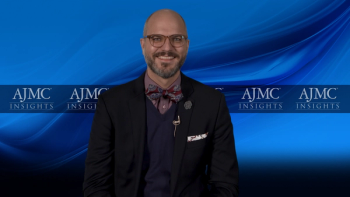
Aaron Gerds, MD, MS, explores the future landscape of myelofibrosis with insights from the 2003 ASH Annual Meeting and Exposition (ASH 2023), and delves into anticipated data on combination therapies and ongoing trials shaping the next phase of myelofibrosis treatment.

Robert Gabbay, MD, PhD, delineates key differences between type 1 and type 2 diabetes, including autoimmune antibodies, insulin resistance, and insulin deficiency.

Jessica Nance, MD, MS, reviews the data and evidence that led to accelerated approval of delandistrogene moxeparvovec-rokl for the treatment of ambulatory pediatric patients aged 4 through 5 years with Duchenne muscular dystrophy (DMD) with a confirmed mutation in the DMD gene.

Emma Ciafaloni, MD, FAAN, dives into the latest developments in gene therapy for muscular dystrophies, focusing on Duchenne muscular dystrophy, and discusses challenges, genetic causes, and the transformative potential of gene therapies.

A medical expert discusses efficacy of approaches such as carboplatin doublets, checkpoint inhibitors, and PARP inhibitors for patients with platinum sensitive and platinum-resistant ovarian cancer.

Pam R. Taub, MD, FACC, FASPC, highlights disparities in access to effective evidence-based therapies for minorities, emphasizing the gap between innovation and access.

259 Prospect Plains Rd, Bldg H
Cranbury, NJ 08512
© 2025 MJH Life Sciences®
All rights reserved.
